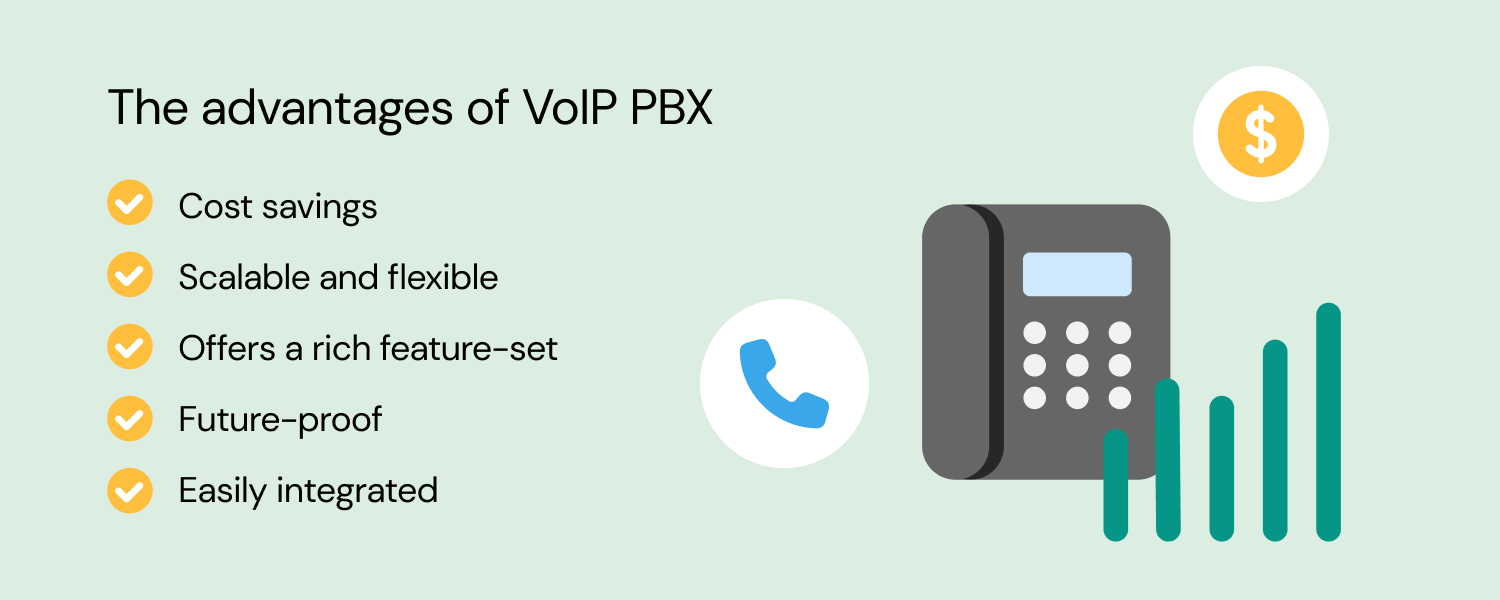Insights
From traditional PBX to VoIP PBX: An overview

The telecommunications industry has seen many changes through the years, and PBX (Private Branch Exchange) technology has led the charge. PBX technology allows organizations to connect multiple phone lines within their network to each other and the public telephone network, providing seamless communication inside and outside the organization.
However, traditional PBX systems were costly and lacked flexibility, which meant small and medium-sized businesses weren’t interested.
Enter VoIP (Voice over Internet Protocol) PBX technology to change the game, making PBX systems more affordable, scalable, and feature-rich.
In this guide, we’ll explore the benefits of switching from traditional PBX to VoIP PBX, the latest trends in PBX technology, and the future of PBX systems.
If you want to boost your existing PBX system or replace it with a new solution, cloud communications can help you achieve your goals. With cloud communications, you can enjoy advanced features and functionality without investing in or managing the underlying infrastructure. So let’s dive in and discover the world of PBX technology!
Understanding PBX technology
PBX technology is a telephone system connecting multiple phone lines within an organization to each other and the public telephone network. It allows users within an organization to speak with each other and the outside world without using the public telephone network for each call. PBX can be traditional, based on analog lines and hardware, or VoIP, based on digital technology and the internet.
Traditional PBX systems were designed for large organizations and were quite expensive to get started. They were also limited in functionality and often needed separate systems for voice and data.
VoIP PBX systems are much more affordable, flexible, and feature-rich. VoIP PBX provides the same core functionality as traditional PBX but with the added benefit of making and receiving calls over the internet.
VoIP PBX systems send and receive voice and data packets over IP networks. In other words, voice calls get converted into digital data and transmitted over the internet, like any other data. So you might hear people call VoIP PBX a digital or IP PBX system.
VoIP PBX offers many advantages over traditional PBX systems:
- It’s more affordable to implement and maintain, making it attractive for small and medium-sized businesses.
- It’s more scalable and flexible — add or remove users as needed.
- It offers improved functionality and features compared to traditional PBX. For example, VoIP PBX systems often include unified communications, which allow users to access voice, email, and messaging from a single platform. Call routing and handling are also improved with VoIP PBX, making it easier for businesses to manage and track calls.

Why is PBX technology essential for businesses looking to upgrade their phone system?
While some organizations still use traditional PBX, VoIP PBX systems are quickly becoming the preferred option thanks to their affordability, flexibility, and advanced features. By understanding the advantages of VoIP PBX, businesses can make wise choices about communication needs and stay ahead of the competition.
The advantages of VoIP PBX
Check out some benefits of switching from traditional PBX to VoIP PBX:
Cost savings
Because they work over an internet connection, there’s no need for expensive hardware installations, phone lines, or maintenance.
A business with high call volume can benefit from cost savings thanks to call routing and handling features. Calls can be automatically routed to the most appropriate person or department, reducing the need for extra staff to manage incoming calls.
More scalable and flexible
Businesses can easily add or remove phone lines or extensions, depending on their needs.
For example, if your business has a seasonal increase in call volumes, you can quickly add more phone lines to your VoIP PBX system to help out. Likewise, if you’re downsizing, you can reduce the number of phone lines and extensions too! VoIP PBX systems are ideal for businesses with changing communication needs.
Rich feature-set
Unified communications can help businesses communicate across different platforms like email, instant messaging, and voice calls, all in one application. So employees can switch between communication channels without switching applications.
Calls can be routed automatically to the most appropriate extension or employee; based on the caller’s needs — this ensures direct connection to the right person or department, which can help improve customer satisfaction.
Ease of integration
Integrating VoIP PBX with business systems like customer relationship management (CRM) software is a breeze. Integration with CRM systems helps businesses get a complete view of customer interactions and activities; so they can offer a more personalized and efficient service.
Integrating a VoIP PBX system with a CRM system gives customer service agents access to call history, account information, and previous interactions, making it easier to understand customers’ needs and provide personalized service.
Future-proof
Traditional PBX systems are becoming outdated, and businesses using them will eventually face compatibility issues and limited support.
VoIP PBX systems are more future-proof — they are simple to update, ensuring businesses stay current with the latest technology. Also, VoIP PBX systems are more compatible with emerging technologies like AI and chatbots that can help with more automated, personalized conversations.
In summary, VoIP PBX is a more modern and efficient solution for businesses needing to stay connected with customers and employees. It offers cost savings, scalability, and a rich feature set that can help businesses streamline communication systems and improve productivity.
Considerations for switching to VoIP PBX
Before making the switch from traditional PBX to VoIP PBX, there are a few things to consider:
Network infrastructure and internet connectivity
A robust network infrastructure and reliable internet connectivity are crucial to ensure a seamless transition. VoIP PBX relies heavily on internet connectivity, so a weak or unstable connection can result in poor call quality or dropped calls.
Costs
There are costs associated with hardware and software, as well as training and support for your team. VoIP PBX systems are typically less expensive than traditional PBX, but be sure to factor in all ongoing maintenance costs.
Choosing the right VoIP PBX solution
Do your research — different solutions offer different features and benefits, so finding the right fit for your business is vital. Consider cost, reliability, scalability, customer support, and ease of use.
Training and support
Once you’ve chosen a VoIP PBX solution, ensure your team gets training on using it properly. Includes training on making and receiving calls, using advanced features, and troubleshooting issues. It’s also critical to have access to reliable customer support should any technical issues arise.
Security
VoIP PBX is vulnerable to security threats like hacking and eavesdropping, so use proper security measures, like firewalls and encryption, to protect systems and sensitive information.
By considering these key factors, businesses can ensure a smooth transition to VoIP PBX and make the most of this technology.
The future of PBX technology
PBX technology is constantly evolving. Emerging trends include cloud-based solutions and unified communications. Additionally, as the demand for VoIP PBX gets larger, traditional PBX systems will likely decline in popularity.
CPaaS (Communications Platform as a Service) is also playing an increasingly important role in the evolution of PBX technology. CPaaS helps businesses build, deploy, and manage communication applications and services on demand. With cloud communications, businesses can take advantage of next-level features, such as voice and video calling, messaging, and screen sharing, without investing in and managing the underlying infrastructure.
How cloud communications can help enhance or replace your PBX system
You can offer your customers the benefits of VoIP PBX and cloud communications to enhance or replace traditional PBX systems to improve communication systems, save money, and stay ahead of the competition, making it easier for them to enjoy advanced features without worrying about technical details.
PBX technology is evolving, and the transition from traditional PBX to VoIP PBX is happening quickly. With the advantages of VoIP PBX and the growing popularity of cloud communications, it’s a good time for resellers, MSPs, and RLECs to consider offering these solutions to their customers.
Whether you want to enhance an existing PBX system, or replace it with a new solution, cloud communications can help you achieve your goals.
So why wait? Start exploring the benefits of VoIP PBX — contact a Sinch Voice expert today!



